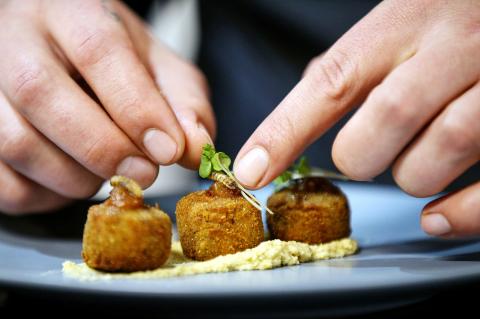A prize so valuable that a lieutenant colonel sent an agent on not just one mission to secure it, but two. The item? A box of tahini.
An agent from Israel’s military intelligence service was tasked with buying jars from a Palestinian village in the West Bank for, reports the Jerusalem Post, “non-operational needs.”
It led to a military police investigation, with the senior official who gave the order discharged and others reprimanded, including a prison sentence for one.

Photo: REUTERS
It isn’t known from which village the sesame paste was procured, but Nablus, in the occupied West Bank, is famous for its tahini.
“It has been for hundreds of years,” says Joudie Kalla , chef and author of the cookbooks Palestine on a Plate and Baladi.
“I think it is the most amazing tahini because it is not mass-produced. They don’t use modern technology, they are using 150-year-old machines that grind it, almost by hand, so the texture is far superior to many other brands — even other Palestinian brands that use more modern methods.”
The small batches mean the producers — often small family firms — can keep the quality high.
“It should be 100 percent sesame seeds, but other brands use other nuts to get that flavour [and] to bulk it up.”
Although it is more expensive, it is bought by ordinary Palestinians, says Kalla, although because of the political situation, she hasn’t seen it exported around the world.
“I have not seen it here in the UK. I think the only way you can get it is if you have someone going there and bringing it back. My family brings it back for me and it really is very different. It’s got a nuttier, creamier consistency. The tahini I buy here is quite watery. The ones from back home are slightly thicker, a bit more smoky, a caramel color, they have a peanut-buttery texture.”
She uses it, she says, on everything.
“I did a cooking class the other day and we used it for falafel. I use it to make tahini brownies, I use it on fish with lemon, yoghurt, tomatoes and parsley. We mix it in salads, on meat. It’s healthy, a good fat and it tastes great.”

Not long into Mistress Dispeller, a quietly jaw-dropping new documentary from director Elizabeth Lo, the film’s eponymous character lays out her thesis for ridding marriages of troublesome extra lovers. “When someone becomes a mistress,” she says, “it’s because they feel they don’t deserve complete love. She’s the one who needs our help the most.” Wang Zhenxi, a mistress dispeller based in north-central China’s Henan province, is one of a growing number of self-styled professionals who earn a living by intervening in people’s marriages — to “dispel” them of intruders. “I was looking for a love story set in China,” says Lo,

It was on his honeymoon in Kuala Lumpur, looking out of his hotel window at the silvery points of the world’s tallest twin skyscrapers, that Frank decided it was time to become taller. He had recently confessed to his new wife how much his height had bothered him since he was a teenager. As a man dedicated to self-improvement, Frank wanted to take action. He picked up the phone, called a clinic in Turkey that specializes in leg lengthening surgery — and made a booking. “I had a lot of second thoughts — at the end of the day, someone’s going

In the next few months tough decisions will need to be made by the Taiwan People’s Party (TPP) and their pan-blue allies in the Chinese Nationalist Party (KMT). It will reveal just how real their alliance is with actual power at stake. Party founder Ko Wen-je (柯文哲) faced these tough questions, which we explored in part one of this series, “Ko Wen-je, the KMT’s prickly ally,” (Aug. 16, page 12). Ko was open to cooperation, but on his terms. He openly fretted about being “swallowed up” by the KMT, and was keenly aware of the experience of the People’s First Party

Standing on top of a small mountain, Kim Seung-ho gazes out over an expanse of paddy fields glowing in their autumn gold, the ripening grains swaying gently in the wind. In the distance, North Korea stretches beyond the horizon. “It’s so peaceful,” says the director of the DMZ Ecology Research Institute. “Over there, it used to be an artillery range, but since they stopped firing, the nature has become so beautiful.” The land before him is the demilitarized zone, or DMZ, a strip of land that runs across the Korean peninsula, dividing North and South Korea roughly along the 38th parallel north. This